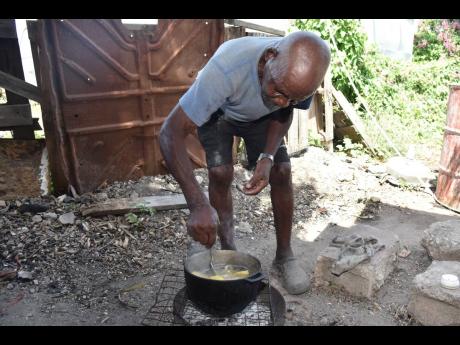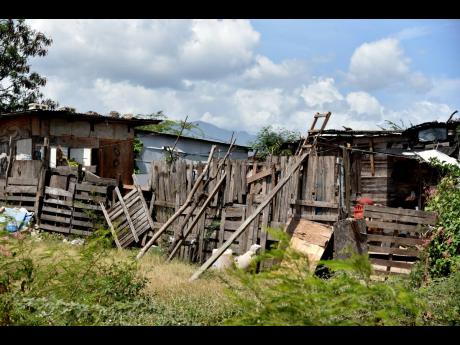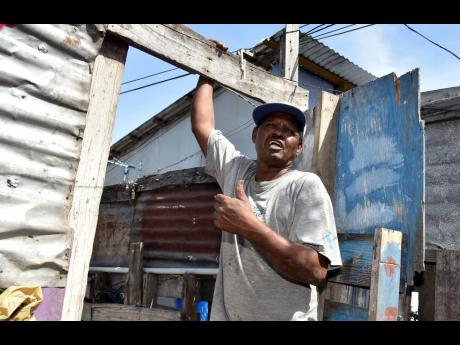‘We are willing to pay for it tomorrow morning!’
Residents of burgeoning Seaview Gardens squatter community hopeful they’ll get to own the land
There is a small informal community on the outskirts of Seaview Gardens in St Andrew, where residents live isolated from the rest of the area on bushy swamp lands strewn with board and concrete dwellings.
Here, there are no roads. Dirt tracks, lined with dangling electrical wires, join at least a dozen dwellings; and each newcomer must dig himself a pit to use as his toilet.
There is no piped water.
Buckets of the commodity must be hoisted on shoulders or hosed from outlets to and from Phase Two of the formal scheme metres away. Yet somehow, it feels homely; and its handful of residents are welcoming.
Their stories vary, yet have a common theme: hardship.
From an 88-year-old father, whose home was recently sold from under him, to a 24-year-old medical student raising two children on her own after the death of their father, each story is particularly heart-rending.
A decade ago there were only two residents living in this lot behind Berger Paints Jamaica Limited on Spanish Town Road, which locals have dubbed ‘Phase 3’ of the officially two-scheme community.
Today, there are at least 20 – some small children darting happily under clothes lines; and their parents who range from taxi operators to fishermen.
They remain hopeful, willing to pay for their lots, though the Ministry of Housing’s notice to leave the area more than two years ago was explicit.
“Cease all activity, remove all encroachment, vacate said land and deliver up possession of the aforesaid property,” read the letter, dated June 19, 2019, citing a Janet Blackwood as legal officer. “Further, you are given notice that you are required to vacate said land which you occupy without permission or consent within thirty (30) days of the service of this notice.”
The letter warned that steps will be taken to physically remove the inhabitants, and that there would be legal proceedings against them to recover any costs associated with such actions.
“We just want them to tell us a money that them want us to pay and we will pay it. We don’t have any problem because this is our home,” offered Michael McCallum, one of the early inhabitants of the site eight years ago.
“We work to keep our community clean. You can’t make a mess everywhere; you have to make sure everywhere is clean and smells good and fresh,” McCallum shared with The Sunday Gleaner during our visit last week.
“That means that we don’t want no fowl coop over here. People want to build a fowl coop but we tell them that can’t go on because that is going to stink up the place.”
McCallum said a pit takes about two days to build,” and we just put in two of them drums there in it and it’s good; and know that we just live on.”
Residents said that prior to getting the notice, they sought advice from a People’s National Party representative, and that even afterwards their safety was reassured by the individual.
“They sent us back up there with a list, and they said don’t fret on tractors, don’t fret on trucks. Don’t fret nobody,” said McCallum. “But we are willing to start paying for it tomorrow morning. Because we can get to own our place.”
GOOD AND BAD
Natoya Dunbar* has been living in the scheme for just under two years with her boy and girl children, ages seven and three. They lost their father a year ago, and since moving there, she has found both challenges and solace.
This is amplified by first-year studies to one day become a paediatrician, she said, expressing an undying love for children.
“Living here has its good and its bad. It is bad because you don’t know when you are going to be evicted; and it is good because you are raising your kids secluded. So when gunshots are firing (nearby) you are not near it. If I got a chance I would build something more proper here for my children,” she said.
James Wilson has been living in his single board room dwelling on the property for the last six months. He claims one day strangers showed up at his house in Seaview Gardens, telling him that they have bought it through his son. Since then, the 88-year-old has been making do in the settlement.
“I’m alright but I’m lonely. And sometimes me fraid because I am sickly. My head gives me problems sometimes, and I will fall down when nobody is here,” he said, stirring a pot of dumplings on a coal stove outside his pit toilet last week. He needs proper food in order to take his medication.
To date, the Government has identified just over 700 squatter settlements across Jamaica, according to the Squatter Management Unit, which is presently carrying out a survey to get more up-to-date data. The plan is to regularise these communities, by acquiring the properties and providing land titles to the residents.
The planned regularisation has built hope in the residents of the Seaview Gardens squatter settlement, which comprises 57 lots.
‘TAKING TOO LONG’
Richard Pandohie, president of the Jamaica Manufacturers and Exporters Association, is of the view that the Government should move with alacrity to deal with the squatting problem.
“The Government certainly has a programme in place to issue titles but it’s taking too long. If the Government could issue titles faster and regularise, people would be able to build houses on them because they could get loans,” reasoned Pandohie, pointing to squatter settlements in Montego Bay that mushroom as more and more people move to the area in search of work in the tourism sector.
Many of the inhabitants in informal settlements are good law-abiding people, but there is also the bad, he noted.
“They (government) see the settlements sprouting up and nobody does anything about it,” Pandohie said, noting that these settlements invariably lead to crime and drive up security costs for businesses in their general locations.
“I believe that the Government in general has very badly wasted the role of the National Housing Trust (NHT). The NHT has so much surplus funds and because it’s not ever going to be used, the Government takes those funds for its purpose, instead of finding a solution to build homes for poor people,” he argued.
Meanwhile, the Jamaica Public Service has noted that: “The rate of electricity theft is high in squatter communities, usually over 60 per cent of the energy supplied to the community. This high level of theft is largely due to the fact that most of the houses do not have proper electrical wiring and are therefore not certified as safe to receive electricity.”




